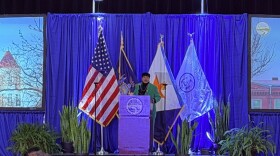Vitamins and supplements are big business in the U.S. But herbal supplements have recently come under scrutiny amid accusations that sometimes they do not even contain the herb they are advertised to. This week on WRVO's health and wellness show "Take Care," hosts Lorraine Rapp and Linda Lowen interview Dr. Arthur Grollman, professor of pharmacological sciences and experimental medicine at Stony Brook University, bout exactly how herbal supplements are -- or are not -- regulated by the government.
Lorraine Rapp: There has been concern about the herbal supplement industry for a long time, but recent events have brought it to the forefront. What sis the difference between herbals and vitamins?
Dr. Arthur Grollman: They are both manufactured as dietary supplements. There is no difference whatsoever in terms of the law: the law being the Dietary Supplement Health Education Act which was passed in 1994 and classified those two together. The law would be much better if it limited itself to vitamins and minerals, where we have far less problems. So we really are focusing today on the troublemaker of the dietary supplements and that is herbs or botanicals.
Rapp: So what regulations are in place now that govern the supplement industries?
Dr. Grollman: Basically, if you decide you want to manufacture an herbal supplement, just you, yourself, you merely need to convince yourself, no one else, that this is safe. Then you notify the FDA, and within 30 days, unless they make an argument against that– and remember there are 10s of 1,000s of herbal supplements out there and an extremely small staff– you then bring that manufacturing out. The burden of proof then is on FDA, not on you at that point, to be safe.
Linda Lowen: What you are saying is it is completely self-regulated. The manufacturer determines ‘This is there; I say it’s there, it’s there.’
Dr. Grollman: No, we have to remember there has been one test case, a very dramatic one, started 10 years ago on the herb called ma huang, or ephedra, which had caused 10’s of 1,000s of injuries and deaths. Nevertheless, it was still on the market and the FDA was challenged to say ‘This is safe.’ It took eight years for them to get the evidence together to have ephedra withdrawn. Unfortunately, but predictably, they replaced it with another herb that did the same exact thing as ephedra. So, there is regulation, but it really is not from a practical point.
Rapp: We wondered what your advice is to consumers who have found certain herbal supplements helpful, want to continue taking them but only want to do so if they are sure what they are buying is safe. What’s your advice?
Dr. Grollman: My advice is if you have health problems or you are taking prescription drugs, do not take herbal supplements at all. If you don’t have those, certainly purchase those which in which some testing has been done on their composition– not what the company says but an independent third party. Probably the best of those, and not perfect, is USP, which has a stamp of certificate: they have measured certain things in them, they have not measured everything, most importantly they haven’t measured real adulturants. But, the best thing you can do is find something with the USP stamp– that is a third party, remember, not the United States Government. But very few, at present, herbal supplements have those.
More of this interview can be heard on "Take Care," WRVO's health and wellness show Sunday at 6:30 p.m. Support for this story comes from the Health Foundation for Western and Central New York.






